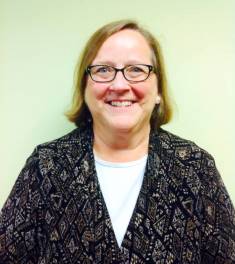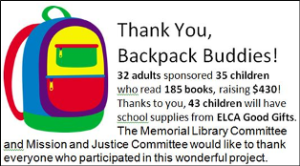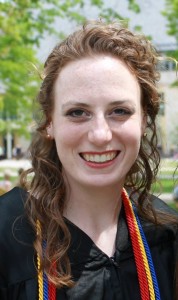This week, we are happy to welcome Alison Northrop as a guest writer. Her post below originally appeared in the January newsletter of Zion St. John Lutheran Church in Sheffield, Iowa, and on the Northeastern Iowa Synod’s blog, “God’s Work, Our Blog.” If you haven’t had a chance to see the synod’s blog, check it out for some great posts at www.northeasterniowasynodelca.blogspot.com.
When I was younger, I was a picky eater. To be fair, the incident I’m about to describe involved eating lamb brains at an age when I still enjoyed the show “Lamb Chop’s Play-Along.” I was at a Greek restaurant in Sioux Falls, South Dakota, with my father and his mother.
Absolutely nothing on the menu was appealing to me. The restaurant smelled funny, I was tired, and quite frankly, I was stubborn. I remember settling on a salad which was far from filling, but at least I knew what was in it. Then my grandmother declared that I would try her dinner, and I would like it. Folks, it’s a terrible idea to tell an 8 year-old that you just made her eat brains – while she’s still chewing.
As I spat out my food and frantically tried to rinse my mouth out, my grandmother gave me THE line. “There are starving children in Ethiopia. You should be grateful to have food!” At the time, I mumbled that I would be more grateful to have normal food, but like most picky eaters, I heard this line frequently through childhood.
Over 800 million people in the world are chronically hungry. That’s 1 in 8. Chronically hungry means undernourished to the point of not being able to lead a normal, active life. Notice I said world, not just Ethiopia. When American people think of hungry children, many typically think of African children whose bones stick out. Those children do exist and do need our help, but there’s another face of hunger that we don’t like to think about. You see these faces all the time, in person.
If you think there are no hungry children in small-town Iowa, you are so very mistaken. Food insecure children often rely on their schools for regular meals. These children can depend on their schools for breakfast and lunch but often don’t know if they will eat dinner when they go home, or if they will have much or anything to eat over the weekend and school holidays. These children may be irritable or hyperactive, show vitamin deficiencies, and have difficulties in school. Chronic hunger affects brain development; necessary development for our future leaders.
One out of every two children will rely on food assistance at some point in their lives.[1] That assistance isn’t always enough. In fact, it rarely is. The price of food steadily climbs, and parents often have to choose between healthy food for a week or two and junk food that they can stretch through the month. A twelve-pack of Ramen noodles is less than half the price of a gallon of milk. What would you do in that situation? Empty calories get you through the day, but it’s incredibly unhealthy in the long term.
The problem is not with food production. This planet produces enough food to feed its entire population. The problem is with distribution. It could be a corrupt government that withholds foreign aid from its people.
Or it could be a food desert or “food swamp” in large metropolitan cities and small towns. A rural food desert is classified as a county where residents have to drive 10 or more miles to the nearest supermarket or grocery store. The classification of an urban food desert is one mile to the nearest supermarket or grocery store.
So how do people get to this point? Laziness? Drugs? Sometimes, yes. But when more than half (and as much as 85%) of families on food assistance have at least one working adult in the home, I find it hard to believe that the majority of those who are hungry are lazy. Often, it’s a matter of circumstance.
Those who are born into poverty are more likely to stay in poverty. Sometimes the main provider of a family loses their job and cannot find another. Some families go from a two-parent home to a one-parent home, often due to divorce or death. Have you ever wondered what a single parent with multiple children goes through when the other parent doesn’t pay child support?
Why should any of us help people facing food insecurity? Some of us have fallen on tough times ourselves and pulled ourselves up by our bootstraps.
Maybe we should do it because the children in these situations didn’t make the choices that got them there. Whether it’s the parent’s bad choices, lost jobs, or divorce, it is NOT the fault of the child.
Maybe we should help these families because it’s what Jesus expects of us.
For I was hungry and you gave me something to eat, I was thirsty and you gave me something to drink, I was a stranger and you invited me in…
Matthew 25:35
In December, our congregation (Zion St. John Lutheran) displayed what kind of Christians we wish to be. The amount of food we sent to the Franklin County food pantry was overwhelming. The Spirit of West Fork is a program that assists families in providing for their children at Christmas.
With the school’s winter break lasting two full weeks and three weekends, there are a lot of meals that the school will not be providing to the children that rely on them. Our congregation sent over 300 items to the school to be distributed through that program. The Spirit of West Fork served 26 families this year, with a total of 70 children.
I don’t know what the situations of those families are, and I don’t need to. I am just thankful that as a congregation, we did not let these children go hungry through our own inaction.
God’s peace,
Alison Northrop
Director of Youth & Family Ministries
Zion St. John Lutheran, Sheffield, Iowa
**Thanks to Alison and Pastor Joelle Colville-Hanson for permission to re-post.
[1] “Estimating the Risk of Food Stamp Use and Impoverishment During Childhood,” Archives of Pediatric and Adolescent Medicine, 163(11), November 2009.











 dynamic ELCA World Hunger team in Chicago! I will be serving as a Program Assistant for the next year through a placement with the Lutheran Volunteer Corps (LVC). I am honored to be the first LVC member to work with ELCA World Hunger and am excited about all the year has in store. I will be working with Education and Constituent Engagement.
dynamic ELCA World Hunger team in Chicago! I will be serving as a Program Assistant for the next year through a placement with the Lutheran Volunteer Corps (LVC). I am honored to be the first LVC member to work with ELCA World Hunger and am excited about all the year has in store. I will be working with Education and Constituent Engagement.